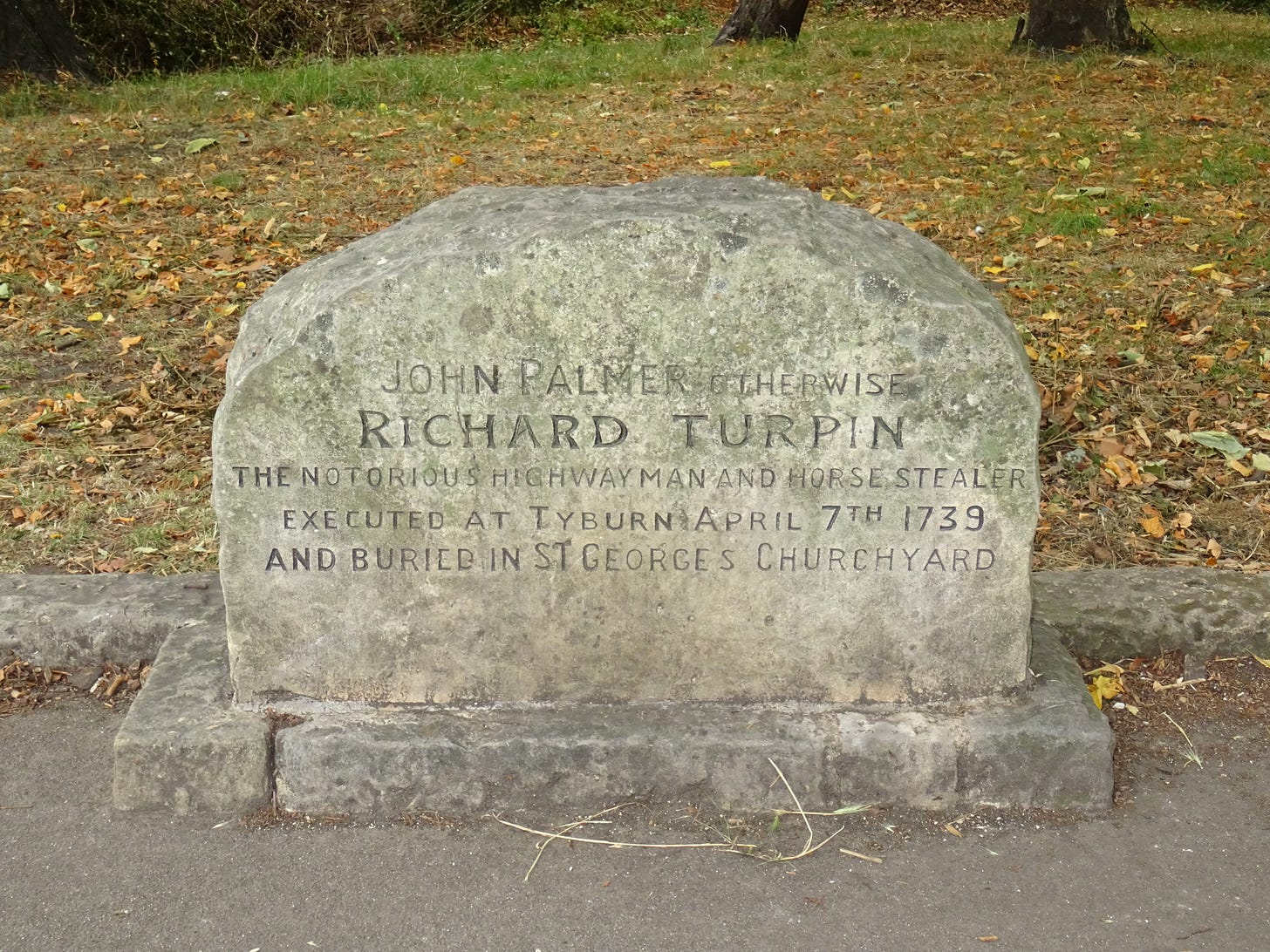A little Good Friday extra post for everyone. Happy Easter.
I like the Hilton Garden Inn at Hatton Cross, it’s a fine hotel, it has cheap parking and it’s on the free bus route. Yes, that’s right, I’m a cheapskate. It also sits right next to the Great South West Road which, to me, conjures up stagecoaches from the centre of London to Jamaica Inn or open top tourers of the 1920s with Jeeves and Wooster rushing down to Deverill Hall to save Gussie Fink-Nottle from a fate worse than marriage.
If you know today’s Great South West Road, you can imagine my disappointment. It is a short stretch of dual-carriageway between the Esso garage at Feltham and the kebab van on the roundabout at Hounslow. The inter-war semis and post-war council houses now have juddering juggernauts and thundering Airbuses filling their days.
Not to be deterred from my fantasies of coaching roads, on my stay at the Hilton Garden Inn, I set off to find Dick Turpin Way, which I had spotted on a map.
Unfortunately, it was not a map which I had remembered to take with me, so I had to try to find the road from memory and, it seems, my memory was poor. Either that or I’d been holding the map upside down when I’d memorised it.
I crossed the Great South West Road and turned left. I remembered Dick Turpin Way as being quite close so, after 500 yards with no trace, I tried another tactic and headed off across the Causeway nature reserve by the River Crane. It seemed to me to be reserved mainly for empty Fosters lager cans. When I emerged onto the A312 near to some anonymous industrial buildings, I asked an elderly and apparently very heavily-medicated lady for directions.
“It’s closed, it’s where you can’t come out now if you’re in a car. Go down to the farm.” She told me, which sort of sounded as though she’d answered several entirely different questions by putting both them and her answers in an obscure Samoan dialect through Google Translate.
I thanked her and carried on. It seemed unlikely that I would find a farm under the flightpath of A380s and next to a four-lane road and an industrial estate but she was right, there was a farm here. It called itself an “Urban Farm” which is a bit like a “Rural City” or a “Catty Dog” but, apparently, here you can pet a chicken or a goat or a Uromastyx, whatever that is. I would never find out as the farm was closed.
A little further on I found a very elderly and wrinkled lady, who looked precisely as though she was made entirely of prune, and asked if she knew where Dick Turpin Way was. She was equally helpful.
“It’s not for bus here, only in other way.” She replied.
She did, however, point, and by following her wrinkly finger, I did eventually find Dick Turpin Way. It is about 150 yards long and, at the time, had just one building on it, a house which had been converted into the headquarters of PSS Aviation Support who, according to their sign, had been serving the aviation industry for ten years.
There are also, quite incongruously, paddocks with grazing horses. Another 150 yards further on was my hotel. I had not taken the direct route but I had stumbled across two of the most confused and confusing people I would ever meet.
I’m not entirely sure why this very small stretch of road is named after the most famous highwayman of all time. Of course, he did carry out the occasional armed robbery on Hounslow Heath but that surely can’t really explain it. Is it just because he committed some dreadful crimes here? That’s like the London North-western Railway naming an engine “The Ronnie Biggs” or Leeds City Council renaming the road next to the Premier Inn, Peter Sutcliffe Way.
One of Dick Turpin’s earliest robberies was with his partner, Thomas Rowden, on 20th August 1735 when, on Hounslow Heath, they stole a pocketbook and six guineas from a Mr Godfrey.
This was a month before Dick’s thirtieth birthday. He had, until quite recently, been most involved in crime as part of a gang of deer poachers in Essex. This was possibly because Turpin, like his father, was a butcher, and helped the gang dispose of the carcasses.
The gang went on to be involved in other crimes, mainly what we would today call aggravated burglary. It’s not known how deeply young Dick was involved but by 1735 most of the gang had been arrested and Dick started out on his solo career as a highwayman.
Most of his crimes were committed to the north of London and in Yorkshire, not near here at all. Dick Turpin was hanged in York on 7th April 1739 for horse theft. Ever the dandy highwayman (who you’re too scared to mention), he bought a new frock coat and shoes in which to be hanged.
It seems, however, that I was Dick Turpin’s last victim, having been robbed of most of my evening looking for a hundred and fifty yards of rather unspectacular road.
Thanks for reading Bunking Off with Adrian Bleese. Subscribe for free to receive new posts and support my work or read more right now here Above the Law.








